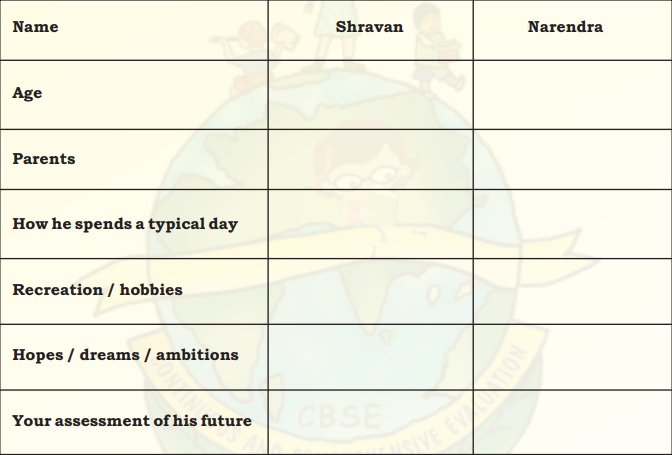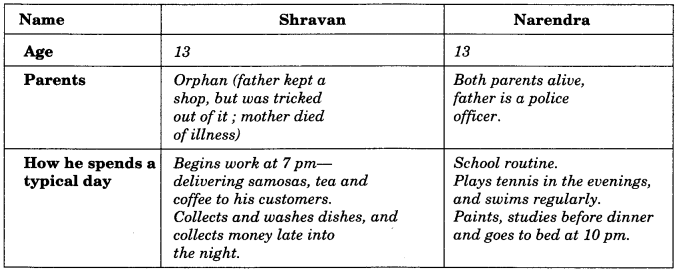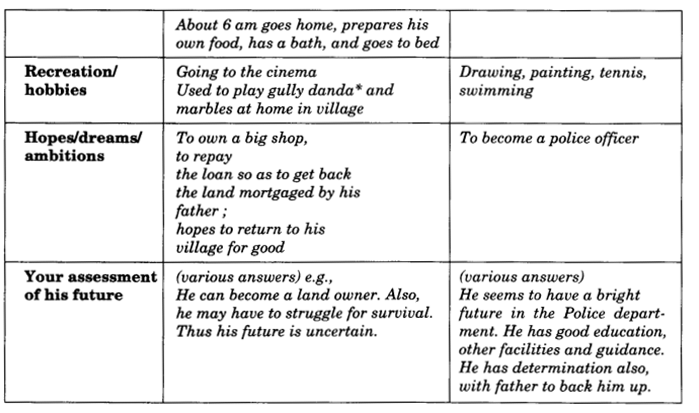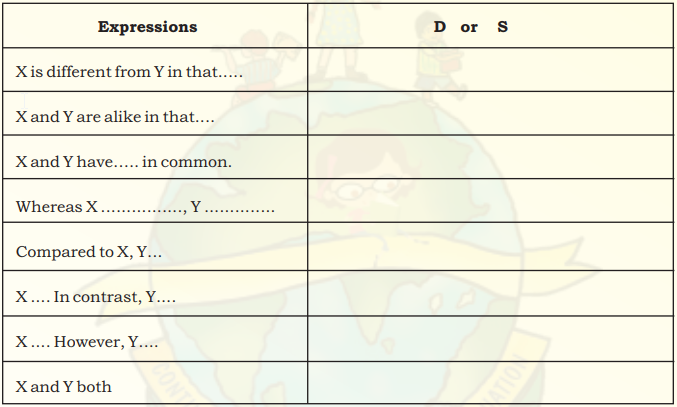NCERT Solutions for Class 9 English Main Course Book Unit 6 Children Chapter 2 Children of India are part of NCERT Solutions for Class 9 English. Here we have given NCERT Solutions for Class 9 English Main Course Book Unit 6 Children Chapter 2 Children of India.
| Board | CBSE |
| Textbook | NCERT |
| Class | Class 9 |
| Subject | English Main Course Book |
| Chapter | Unit 6 Chapter 2 |
| Chapter Name | Children of India |
| Category | NCERT Solutions |
CBSE Class 9 English Main Course Book Unit 6 Children Chapter 2 Children of India
Question 1.
Below are the pictures of two children – Shravan Kumar and Narendra Kumar – both 13 years of age. (They are not related.) Working with a partner, look at their pictures and predict how each child lives. Write your answer in points.

Shravan Kumar :
_____________________________
_____________________________
_____________________________
_____________________________
_____________________________
Narendra Kumar :
_____________________________
_____________________________
_____________________________
_____________________________
_____________________________
Answer :
Shravan Kumar :
- illiterate and poor
- works in a dhaba
- doesn’t go to school
- has no comfortable life
- livelihood more important
- not much healthy
Narendra Kumar :
- not poor
- is a son of rich parents
- goes to school
- has comfortable life
- career, good life more important
- healthy and cheerful
Question 2.
Here are the stories of the two boys. One student reads the story of Shravan Kumar and the second student reads the story of Narendra Kumar. After reading the story, each student completes his or her half of the table in Question 3.
SHRAVAN KUMAR :
His day begins when most other people’s ends. Thirteen-year old Sharvan Kumar works in a tea shop on Delhi’s Bahadur Shah Zafar Marg,where several newspaper offices are situated.His work begins around seven in the evening when he starts preparing samosas, coffee and tea. He carries these to several offices, does the dishes, and goes around collecting his money, well into the night. Around six in the morning, when all the newspapers are despatched for distribution and the press employees return home, he prepares his food, has a bath and goes to bed.
Shravan is an orphan who came to Delhi from his village in Bihar in search of work. His father kept a shop, but was tricked out of it by a deceitful uncle. Despair drove him to alcohol and gambling, and he died of a stroke soon after. Shravan worked in a tea shop in his village for a while. “When I first began washing other people’s cups and glasses”, he recalls, “I used to feel very bad, I would cry.” Shravan moved to the more lucrative environs of Delhi, where his elder brother Shatrughan had preceded him. A job in a shop selling ice was his first taste of big city life. His mother came to visit him in Delhi, but she fell ill and died soon after. “That was two or three years ago. I don’t remember exactly when,” the little boy says. Soon, Shravan lost his first job. His employer still owes him Rs 500. Following a brief spell of unemployment and a short spell as an assistant at a car park, he joined the tea shop where he is presently employed. The ruthlessness and loneliness of the world has left him shattered. “I think I am all alone in this world,” he says despondently.
Of the Rs 300 that he earns every month, he deposits Rs 200 in the bank. His bank balance stands at Rs 2000, he says proudly. Survival is his immediate aim but there is a larger objective towards which Shravan is working. He intends to retrieve the land that was mortgaged by his father. Already Shravan and Shatrughan have paid back the loan of Rs 8000 – only the interest remains to be paid.
Shravan was a dedicated lottery buyer at one time; until he realized that it was adding nothing to his income. The cinema remains a favourite form of entertainment – he even wakes up early to see the noon show. “I have no friends here. Who keeps awake late at night and sleeps during the day? I miss my village. There, I used to play gully danda and marbles and I had a lot of friends. When I went to the village last year, I met them. They are still studying and playing games. I want to join them, but it is a question of survival for me.” Sharvan’s mother wanted him to own a big shop – “like the one his father owned,” he says wistfully. He dreams of fulfilling her wish. He dreams of getting back their mortgaged land, and returning to the village for good, “I like being in my village. I like the films and the glitter of Delhi, but I prefer the greenery, the trees, and the fields of my village.” Maybe the grit and intelligence he has shown, alone and friendless, in facing a hostile world, will also win for him his heart’s desire.
NARENDRA KUMAR :
Narendra Kumar, a thirteen year old Kendriya Vidyalaya student, was interviewed by The Illustrated Weekly of India. Read what he says about himself.
Interviewer : Hello, Narendra!
Narendra : Hello!
Interviewer : Congratulations! Narendra. I saw your photograph in the newspaper last week, when you won the Soviet Land Nehru Award for drawing and painting. Our readers are anxious to know more about you.
Narendra : Thank you, Sir. I think I was just lucky to get the award. The competition is held every year in my school and a large number of students take part in it.
Interviewer : That’s good, very good. It’s evident that your school encourages students to take part in various activities.
Narendra : Oh yes. Our teachers – especially my Art teacher, Mr. V. Sinha – give us a lot of encouragement. My parents have encouraged me a lot, too.
Interviewer : When did you start painting?
Narendra : When I was three. I was attending the Shishu Vihar Nursery School. My teacher gave me a picture of a big kite one day. The picture was beautiful and that very day I asked my father to buy me some crayons and drawing paper… Soon my room was full of crayons and paper! I kept drawing whenever I found time. I now have a mini art room of my own at home!
Interviewer : That’s great, really great! Do you want to become an artist when you grow up?
Narendra : No. Drawing and painting are just hobbies, which give me a great deal of pleasure. I want to become a police officer when I grow up. That’s the only thing I’ve ever wanted to be.
Interviewer : Is that because your father is a police officer?
Narendra : Yes, maybe. I’ve been watching my father and other policemen for a very long time. I suppose I want to be like him!
Interviewer : Do you feel you have the qualities that a good police officer needs?
Narendra : Yes, I think so. A good police officer needs to be physically fit and mentally alert. I’m trying my best to grow into a healthy young man. I’m a member of the local sports club. I play tennis in the evenings and I also swim regularly.
Interviewer : How do you find time for all these activities?
Narendra : Well, I suppose I’m busy the whole day. Immediately after school I like to paint or play. I study before dinner and usually get to bed at about 10 o’clock.
Interviewer : Thank you, Narendra. It’s been good talking to you. We wish you success.
Narendra : It’s been a pleasure.
Question 3.
Complete the table for the story you have read. By asking and answering questions, exchange information with your partner (for the story you have not read) and complete the other half of the table.

Answer :


Question 4.
There are many ways of expressing differences and similarities. Read the passage below, and study the expressions printed in italics.
Day School and Boarding School :
Both day school and boarding school are institutions where children go to study. While the former does not provide any residential accommodation, the latter expects children to live on the premises. A boarding school has an advantage over a day school as their classes are normally smaller. However, the two schools are similar in aiming for high standards of education for all students.
Answer :
No question asked.
Question 5.
Below is a list of other expressions. Decide what each expression means, by writing D for difference or S for similarity against each. Try to add more expressions to your list and make use of them in writing your article in Question 6.

Answer :


Question 6.
Write a magazine article about both the boys, in which you bring out the similarities and differences in their lives. Use the table you completed in Question 3. Give your article a suitable title. Remember ‘CODER’.
Organise your article like this :
Paragraph 1 : Give their names and ages. Compare their families, parents and backgrounds.
Paragraph 2 : Compare how each spends a typical day and their recreation/hobbies.
Paragraph 3 : Compare their hopes/dreams/ambitions and your assessment of their future.
Answer :
CHILDREN OF GOD
1. Both Shravan and Narendra are 13 years old. Shravan is an orphan while Narendra’s parents are alive. Shravan’s father had a shop. But he was tricked out of it. Narendra’s father is a police officer. Narendra’s mother is still living, while Shravan’s died of illness. Shravan comes of very poor family background. However, Narendra’s family is well off. Narendra has been brought up in a city, whereas Shravan grew up in a remote village in Bihar.
2. Both Shravan and Narendra spend their days differently. Shravan’s typical day starts at 7 pm, while Narendra’s starts with school routine in the morning. While Shravan serves samosas, tea or coffee to his customers,as he works in a tea stall, Narendra studies at home. Whereas Shravan works whole night, Narendra sleeps at 10 pm and enjoys sleeping whole night. Shravan goes to sleep at about 6 am. However, Narendra rises at this time from sleep. Narendra plays, draws, paints and swims regularly. As compared to him, Shravan has almost no such hobbies. He goes to cinema only. While in village, Shravan used to play gully danda. Narendra paints and draws pictures at this time.
3. As regards hopes, dreams and ambitions, both Shravan and Narendra are alike. However, their goals are different. Shravan dreams to own a shop like his father. He wants to get back their mortgaged land after repayment of loan and finally return to his village for good. Narendra aspires to become a police officer. Both are dedicated, hard working and goal-oriented. It is hoped that they would fulfil their ambitions. Shravan has, it seems, almost achieved his modest goal. Narendra shall, however, take time to achieve it. He, it seems, would definitely be a police officer if everything goes all right. Both seem to enjoy a good future. It is seen from their ambitions, devotion and hard work towards their individual goals.
We hope the NCERT Solutions for Class 9 English Main Course Book Unit 6 Children Chapter 2 Children of India help you. If you have any query regarding NCERT Solutions for Class 9 English Main Course Book Unit 6 Children Chapter 2 Children of India, drop a comment below and we will get back to you at the earliest.